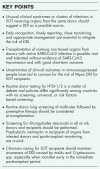Donor-derived infections in solid organ transplant recipients
- PMID: 37555801
- PMCID: PMC10597443
- DOI: 10.1097/MOT.0000000000001094
Donor-derived infections in solid organ transplant recipients
Abstract
Purpose of review: The potential for transmission of donor-derived infections (DDIs) is impossible to eliminate, but a thoughtful and systematic approach to donor evaluation can mitigate the risk. Prevention is a key issue and clinicians must maintain a high index of suspicion and remain vigilant in staying up to date on emerging infections. COVID-19 and Monkeypox have represented a new challenge for infectious disease screening and recommendations have been evolving, as knowledge in the field has grown. Additional considerations for pretransplant deceased donor screening include testing for neglected and endemic infectious diseases such as strongyloidiasis and HTLV 1/2. Molecular diagnostic tests have improved awareness on pathogenicity of mollicutes and fungi in the setting of DDIs. The aim of this review is to provide an update on the most recent literature on DDI with a special focus on these emerging hot topics.
Recent findings: Donor screening for uncommon pathogens must be guided by knowledge of changing epidemiology of infectious disease and availability of new diagnostic methods.
Summary: Appropriate screening, early recognition, timely reporting, close monitoring, and appropriate management are essential to help reducing the risk of emerging DDIs.
Copyright © 2023 Wolters Kluwer Health, Inc. All rights reserved.
Conflict of interest statement
References
-
- Kaul DR, Vece G, Blumberg E, et al. Ten years of donor-derived disease: a report of the disease transmission advisory committee. Am J Transplant 2021; 21:689–702. - PubMed
Publication types
MeSH terms
LinkOut - more resources
Full Text Sources
Medical
Research Materials


